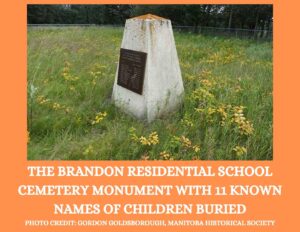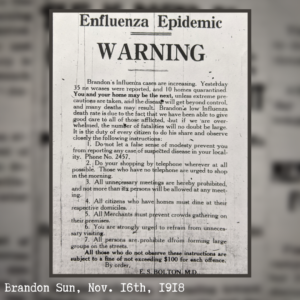The City of Brandon and the BGMA are located on Treaty 2 territory and the shared traditional lands of Cree, Oji-Cree, Dakota, Dene, Anishinaabeg, and is the homeland of the Métis nation.
Brandon’s Residential School, Online Educational and Archival Resources
The purpose of Canada’s Residential School system was to take children far from their homes and force them to disconnect from their people, families, language, stories, and culture to assimilate into Eurocentric colonist standards. These institutions were operated by the Canadian Government and run by churches. Hard labour, physical and sexual abuse, harsh discipline, government experiments, and illness and disease were reported at many of these schools by the investigators, churches, and survivors.
Brandon’s Residential School (also recorded as the Brandon Industrial School) was active for 77 years, from 1895 to 1972. It was located down Grand Valley Road, across from the Experimental Farm property. From 1895 to 1925 it was looked over by the Methodist Church, 1925 to 1969 was the United Church, and from 1969 to 1972 the Roman Catholic Church took it over. It sat abandoned until it was demolished in August of 2000.
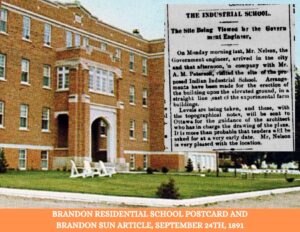
Children with homes in Northern Manitoba and even Ontario were taken away to be brought here–and many are still here.
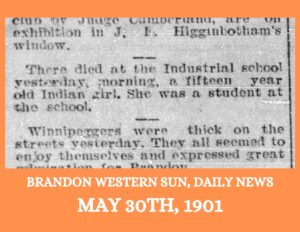
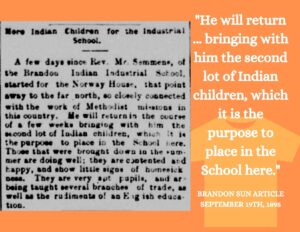
Below is a collection of online resources and archives about Canada’s Residential Schools and the Brandon Residential School. The effect of these schools is still very raw and recent in Canadian and Brandon history. History is our past but it is also our present. If we remain ignorant to what roles these events in our past play in our current day there will be no chance of reconciliation.
Content and language may be triggering to some.
First Nations Health Authority, Indian Residential Schools Program
24 Hour Residential School Crisis Line: 1-866-925-4419, if you require emotional support
Why Do We Wear Orange? Orange Shirt Day, Every Child Matters
Truth and Reconciliation Commission of Canada and the National Centre for Truth and Reconciliation, University of Manitoba and University of Manitoba Archives
The Legacy of Hope Foundation, resources and exhibits including “Forgotten Metis”, “We Were So Far Away”, “Bi-Giwen: Coming Home, Truth Telling from the Sixties Scoop”, “Where Are the Children”, and Generations Lost, Healing the legacy of the Residential Schools.
Stolen Lives: The Indigenous Peoples of Canada and the Indian Residential Schools, Facing History and Ourselves Educational Outline. Examine the Indian Residential Schools and their long-lasting effects on Indigenous Peoples of Canada. This book is also available as a Free Download with Facing History Account
‘We owe this to ourselves’: Teachers learn how to talk residential schools at Winnipeg workshop, CBC News, March 5th, 2017
Investigation of unmarked graves and burial grounds at the Brandon Indian Residential School, thesis by Katherine Lyndsay Nichols Abstract: The purpose of this thesis is to identify the names of the students who died while attending the Brandon Indian Residential School (BIRS) and determine the location of the school’s burial grounds along with the number of unmarked graves on the school property. My research project uses mixed methods including; archival research, qualitative interviews, Ground-Penetrating Radar (GPR), Electromagnetic Ground Conductivity (EM38), control burns, and aerial photography to systematically survey the school’s burial grounds. My investigation into the deaths and burials of BIRS students aligns closely with a larger project being conducted by the Truth and Reconciliation Commission of Canada’s (TRC) Working Group on Missing Children and Unmarked Burials (n.d.). This Working Group attempts to locate the burial grounds for the Indian residential schools across Canada and identify the names of the students who died at the schools in the archives. This research was conducted in collaboration with Sioux Valley Dakota Nation, the University of Manitoba, Brandon University, the United Church of Canada, the Royal Canadian Mounted Police (RCMP), and in consultation with the TRC, Manitoba Historic Resources Branch, and Brandon Research Centre. By using an applied anthropological approach my thesis works to contribute to the ongoing TRC’s Missing Children’s Project. It is my hope that this research can assist the Sioux Valley Dakota Nation with future restoration, protection and commemoration plans.
This thesis has also created a traveling exhibit in an effort to identify and name children that have passed and gone missing from the Brandon Residential School as the Brandon Indian Residential School Mobile Learning Centre.
Brandon Sun, Survivors share stories, memories By: Tyler Clarke, August 31st, 2017
The Children Remembered, Residential School Archives Project, Brandon Residential School
Dr. Peter Henderson Bryce (1853 – 1932), pioneer of public health and sanitation policy in Canada. Early whistleblower on the poor conditions of Residential Schools and treatment of Indigenous Peoples by the Canadians government. Dr. Bryce repeatedly called upon Duncan Campbell Scott of the federal Department of Indian Affairs to correct the conditions at the residential schools, but he would be forced out of government for his reports.
- The Story of a National Crime (1922) by Dr. Bryce
- Report on the Indian Schools of Manitoba and the North-West Territories (1907) by Dr. Bryce
The United Church Archives, Brandon Residential School
The Apologies, The United Church of Canada
Prime Minister Stephen Harper apologies for Residential Schools in 2008
Manitoba Historical Society, Historic Sites of Manitoba: Brandon Indian Residential School and Residential School Cemetery
Manitoba Historical Society, Abandoned Manitoba episode on the Birtle and Brandon Residential Schools
Indian Residential School History & Dialogue Centre, Brandon Residential School
The Eugenics Archives, Brandon Residential School
Unmarked graves of children from [Brandon] residential school found beneath RV park, CTV News, August 31th, 2018 article
Canada’s shameful history of nutrition research on residential school children: The need for strong medical ethics in Aboriginal health research, article published by Noni E MacDonald, MD FRCPC, Richard Stanwick, MD, and Andrew Lynk, MD
Native Land Digital, Territory/Indigenous Land Acknowledgement
If there are resources or articles missing from this list, please submit them to the Brandon General Museum & Archives to be added.
